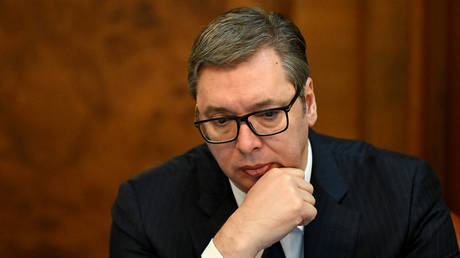
The British outlet claims Belgrade has tacitly approved ammunition sales to Kiev
The West has begun criticizing Kosovo Albanians because Serbia agreed to look the other way as its ammunition is delivered to Ukraine, Financial Times suggested on Tuesday.
According to the UK outlet, the “pipeline funneling Serb ammunition to the Ukrainian front has been a crucial factor in a noticeable shift” in the US, NATO and EU position on Kosovo.
Brussels and Washington demanded new elections in the north of Kosovo after 30 NATO troops were injured in a riot last Monday, as they tried to protect Pristina’s special police from a crowd of unarmed Serb demonstrators. They also sent 700 more Turkish troops to the disputed province.
FT attributed their claim of a “shift” to “three western diplomats in the region.” It quoted the US ambassador to Belgrade, Christopher Hill, as arguing that the Ukraine issue takes precedence over everything else.
“Ukraine is absolutely critical and we are at a point where all hands need to be on deck,” said Hill. “When people are on board, relations get better.” It was not clear from the article itself what he was referring to, however.
As proof of Belgrade’s “change of tack,” FT also quoted Serbian President Aleksandar Vucic, who said he was aware of US government claims that Serbian-made ammunition has ended up in Ukraine.
“I’m not a fool. I am aware that some of the arms might end up in Ukraine,” Vucic told FT. “Is it possible that it’s happening? I have no doubts that it might happen. What is the alternative for us? Not to produce it? Not to sell it?”
Those comments, however, do not differ in style or substance from what Vucic said in February at a major defense expo in Abu Dhabi, or in April to Reuters. The Serbian president has repeatedly acknowledged that Belgrade cannot control what countries like Czechia or Türkiye do with the ammunition they buy. He also accused Croatia and Bulgaria of spreading fake news about Serbian ammunition exports so they could get a bigger share of the market themselves.
Brussels has threatened Serbia with financial reprisals unless Belgrade “harmonizes” its policy with the EU embargo against Russia. Vucic has so far refused to sanction Moscow, arguing that the West’s insistence on Ukraine’s territorial integrity is incompatible with its demands that Serbia violate its own by recognizing Kosovo’s 2008 declaration of independence.




